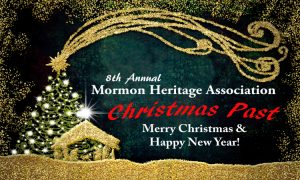On the 2nd Day of Christmas Past,
Question: What does the Christmas song “Good King Wenceslas” bring to mind for President Russell M. Nelson?
To be entered into today’s daily giveaway & FREE tour drawing- Read the story below; “Comment” & “Share” your answer on Facebook or our blog. Click here for contest rules.
“Christmas Thoughts of Home & of Prague”
“At Christmastime, when our family sings ‘Good King Wenceslas,’ I find myself silently reflecting on the real meaning of the words in that song. They are seldom understood, and their connection with Christmas seems obscure.
‘Good King Wenceslas looked out
On the feast of Stephen
When the snow lay round about
Deep and crisp and even
Brightly shone the moon that night
Though the frost was cruel
When a poor man came in sight
Gath’ring winter fuel…’
Several other verses follow, ending with the lines,
‘Therefore, Christian men, be sure
Wealth or rank possessing
Ye who now will bless the poor
Shall yourselves find blessing.’
In spite of that nice Christian reminder to give to the poor, the song has never been one of my favorites. But my call as an Apostle and my many visits to the country of Czechoslovakia have given me a greater appreciation for it.
What was the “Feast of Stephen”? – The Feast of Stephen relates to the Stephen who was stoned to death in Jerusalem. I presume that Stephen was one of the first martyrs after the crucifixion of the Lord. Over the years, the martyrdom of Stephen and the feast that commemorated the event became associated with the birth of Christ. So these two dates were interlocked – the birth of Christ, celebrated Dec 25, and the Feast of Stephen, observed Dec 26.
Who was “Good King Wenceslas”? – King Wenceslas, more correctly spelled Wenceslaus was born in the year 907 near Prague. Wenceslaus is the English translation of his real name, which in the Czech language is Václav. He was one of the first Christian martyrs. In Czechoslovakia, he strove to bring peace between the Christians and non-Christians. For his Christian belief and commitment, he went to a martyr’s death on the doorsteps of a church in Prague. Thereafter he became a patron saint of all Czechoslovakia.
There is a well-known square in Prague (Capitol of Czech Republic) that bears the name of Wenceslaus (in English), or Václav (in Czech). Even through many decades of political oppression, the statue of good King Wenceslaus has stood on this square as a silent symbol of the enduring spirit of Christianity.
The first time Sister Nelson and I went to Wenceslaus Square it was starkly deserted that we could hear the voice of the only other sole person at the opposite end of the square talking in a telephone booth. Subsequent visits we found the same thing with very few people ever outside at night.
Following the “velvet revolution” in 1989 and the crumbling of communism in Czechoslovakia, the mood in Prague changed. The last time we were there (1991) Wenceslaus Square was teeming with people, talking, singing, and enjoying their newfound freedom. It was in this square the “velvet revolution” occurred. Thousands and thousands of people filled the Square and demanded the overthrow of their restrictive regime. A month later, on December 29, 1989, a man became the president of this new democracy who just a few weeks before had been imprisoned for his advocacy of freedom and religious opportunity.
When my thoughts turn back to Prague, I ponder the faith of Church leaders of yesteryear when the Church was first recognized in Czechoslovakia. Missionaries labored with dignity until war and its spoils canceled those privileges. I also remember the leaders with whom I labored alongside in seeking recognition for the Church in Czechoslovakia. During the early days of our inquiries, we learned that recognition could be formally requested only by a Czechoslovakian member of the Church. So we went to the home of Snederflers with that very disturbing information. Brother and Sister Snederfler understood the risks because Czechs had not fared well if their religious affiliation had become known making them subject to surveillance, interrogation, and persecution because of their membership in The Church of Jesus Christ of Latter-day Saints. Faithful to their testimonies ever since their baptisms as teenagers. Jirí and his wife, Olga, saw missionaries and the Church’s official presence removed from Czechoslovakia after the Communists began their totalitarian regime. For more than four decades, they quietly served Church members throughout their native land, encouraging them and seeking to keep faith alive in an environment hostile to religion.
When Church leaders told Jirí in 1988 that renewed effort on his part could change the government’s decision to grant the Church official recognition, he did not hesitate. Although he was putting at risk his family’s safety, his job, his freedom—possibly even his life—he said, “I will go! I will do it!” Embracing his wife, he said, “We will do whatever is needed. This is for the Lord, and his work is more important than our freedom or life.” He and Olga were willing to be martyrs if need be, as were King Wenceslaus, the Prophet Joseph Smith, and others.
On Feb 21, 1990, The Church of Jesus Christ of Latter-day Saints again received official recognition and became registered in Czechoslovakia after many years of restricted existence. These and related thoughts flood my mind as the strains of “Good King Wenceslas” are sung at Christmas time. I think of Christian martyrs, of pioneers, of freedom, and of all who have gone before to make life for us as sweet and meaningful as it is. Because of their pain and tears, my cup of joy is full at Christmastime. At Christmas time and throughout the year we appreciate all the Savior’s gifts – especially the blessing of being members of His Church. He is, in very deed, the Good King who bestows the riches of eternity upon those who love him.”


Recent Comments